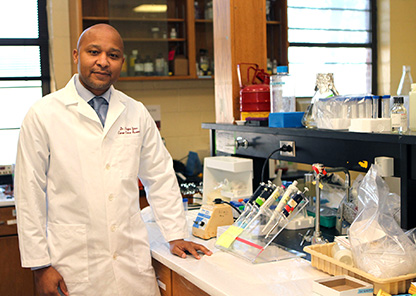A team of researchers at Tuskegee University has developed a new test they say may help detect an aggressive form of breast cancer earlier, especially among African American women.
The breakthrough was published this week in the scientific journal PLOS One. Clayton Yates, a biology professor at Tuskegee University, along with other researchers discovered a new biomarker that can detect a specific type of breast cancer sooner. The discovery will help target cancer treatments toward African American women, who are more likely to be diagnosed later in life.
In African American women, the median age of diagnosis is typically around 55, Yates says. The addition of this biomarker lowered that to around age 49.
Yates says that earlier detection should improve survival rates. Studies show African American women are more likely to die from breast cancer after the initial diagnosis. The additional biomarker will look for specific testosterone receptors and help doctors determine the aggressiveness of the cancer. Yates hopes this discovery will highlight the role ethnicity and genetics play in health disparities among African American women.
-Alexander Richey

